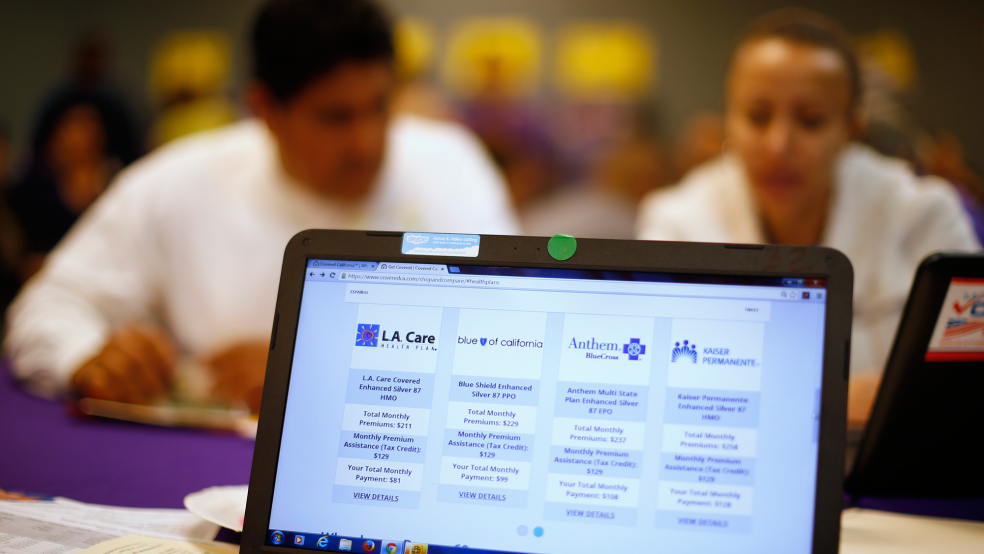The Obama administration announced Monday it expects the number of people who will gain health coverage in the next year through the Affordable Care Act’s insurance marketplaces to be significantly fewer than previous government predictions.
Health and Human Services officials said that 9 million to 9.9 million Americans — as much as 30 percent below other estimates— will have insurance by the end of 2015 through fledgling federal and state insurance exchanges intended for people who cannot get affordable coverage through a job.
Related: The Biggest Threat to Obamacare Is Not a GOP Congress
The figures mark the first time that the administration has made public its view of how popular the marketplaces’ health plans, which began to provide coverage in January, will prove in their second year. They are more pessimistic than estimates last spring by the Congressional Budget Office, which predicted that 13 million people will have health coverage through these insurance exchanges in 2015.
HHS officials, speaking on condition of anonymity, said that their analysis is based on an appraisal of how quickly people have tended to be drawn to other kinds of public health insurance programs when they were new, combined with predictions of how many people who bought health plans through the exchanges this year will keep them.
As of mid-October, the officials said, 7.1 million people were paying customers of health plans they had bought through the marketplaces, a slight decrease from 8 million customers just after the first, shaky enrollment period ended early last spring. The decrease is, in part, because not all customers have continued to pay their monthly insurance premiums—and because the government has dropped 112,000 immigrants who did not prove that they were eligible.
The HHS officials disclosed their estimates five days before the second open enrollment season begins on Saturday.
Related: Four Little Words That Could Kill Obamacare
The administration is touting various improvements they have made to the federal online marketplace, HealthCare.gov, in an attempt to avert a repeat of massive technical problems that frustrated customers — and created political embarrassment for President Obama — when the exchange first opened for people to buy health plans in October of last year.
The lower estimates also emerge as the health-care law, enacted in 2010 as a crowning domestic achievement of Obama’s presidency — is facing new political and legal peril. Congressional Republicans, who won a Senate majority in the mid-term elections last week, have vowed to continue their efforts to try to destroy the law, or at least make dents in pieces of it.
Meanwhile, the Supreme Court on Friday said that it will review the legality of a linchpin of the law: the government subsidies that are helping more than four in five people who have gotten insured so far through the federal exchange to afford their health plans.
In announcing their predictions, health officials said that their analysis suggests that the congressional budget analysts had been too optimistic in assuming that enrollment in the marketplaces’ health plans would reach its final level within the first three years. The officials said that the “ramp up” was more likely to take four or five years.
Related: Obamacare Could Face Large Number of Droputs
The congressional budget analysts predict that 25 million people will have insurance through the federal and state marketplaces by 2015. Health officials declined to say whether they believe that many eventually will sign up, saying they have not done that analysis.
The health officials also forecast that slightly more than eight in 10 people who got coverage this year through the exchanges will renew it for 2015. That means that 5.3 million of the current 7.1 million enrolled will keep their coverage. The officials said they do not expect many of them to become uninsured. Some, they said, will be able to find coverage from an employer, still the way most Americans get health insurances. Others, they said, will find their incomes dropping enough that they begin to qualify for Medicaid, a public insurance program that has expanded under the health-care law in about half the states.
This article originally appeared in The Washington Post.
Read more at The Washington Post:
You'll Probably Live Much Longer Than You Think
China Suspected of Breaching Postal Service Computers
Left Struggled to Move Voters with Koch Attacks and Other Big Money Messages





